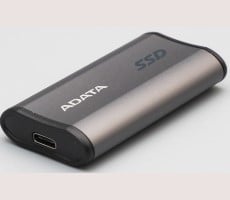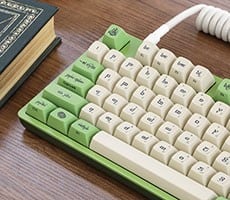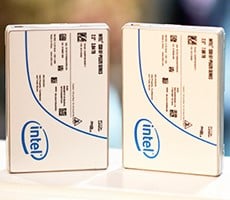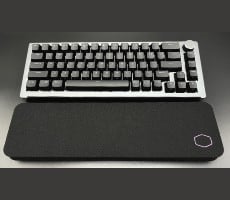|
Adata Elite SE880 External SSD - Starting At: $79
The Adata Elite SE880 is a compact, durable, high-performance external solid state drive, ideal for PC users and console gamers looking to expand their storage.
|
|
|
- High Performance
- Tiny Form Factor
- Tough Enclosure
- Includes USB-A And USB-C Cables
|
- Included Cables Are Short
- Max Performance Requires USB 3.2 Gen2 x2
|
|
Adata's Elite SE880 external SSD is billed as a high performance, sturdy portable drive for road warriors and gamers. This compact SSD is small enough to comfortably fit in a shirt pocket -- it's actually smaller than an Airpods case -- and with 500GB and 1TB capacity options, it should offer plenty of storage space for many users.
The Elite SE880 supports USB 3.2 Gen2 x2, and is capable of reaching maximum interface speeds up to 20Gb/s and actual transfers of up to 2GB/s, if you have a native Gen2 x2 port available that is. This kind of bandwidth is many times higher than legacy external hard drives, which usually hover around 100MB/s, and is higher than any USB thumb drive as well. The high transfer speeds should be fast enough for intensive tasks, such as A/V editing or gaming, for example, though for optimal performance the aforementioned USB 3.2 Gen2 x2 port and UASP drivers are required.
If you are the type of gamer that is constantly in need of more storage space
on your favorite console, Adata also claims the Elite SE880 is up to the task. It should be noted, however, that you may need to format the drive before connecting it to your particular console. Supported consoles include the PS4 Pro and PS5, Xbox One X and Xbox Series X/S.
Adata Elite SE880 External SSD Specs & Features
In terms of OS compatibility, the Elite SE880 is meant for use on Android, macOS, Windows, and Linux -- so it should work on virtually any system or device with the necessary ports. In order to use it with a mobile device, however, that device must support external solid-state storage in order to take advantage of the OTG data backup and transmission functions.

Inside the package, along with the Elite SE880 itself, you'll find one USB-C to USB-C cable, one USB-A to USB-C cable, and a quick start guide. Nothing earth shattering to be sure, but it is nice to see cables provided for both USB port types.

The Adata Elite SE880 has a tough, mostly metal exterior enclosure. The front and back ends are made of a plastic composite material, with the
USB-C port housed at the rear. The bulk of the curved, wrap-around enclosure is aluminum, however, and is very rigid. The Elite SE880 feels high-quality in the hand and it should hold up well over the long haul, even if it spends most of the time in a backpack, laptop bag, or pocket getting knocked around.
Adata Elite SE880 Performance: How Fast Is It?
In order to test the performance of the Adata SE880 Elite external SSD, we enlisted the help of some benchmarks and real world tests. First up is ATTO, a disk benchmark that measures sequential transfer speeds across a specific volume length with various block sizes. It measures transfer rates for both reads and writes and graphs them out in an easily interpreted chart. ATTO's workloads are sequential in nature and measure bandwidth, rather than I/O response time, access latency, etc.


The SE880 Elite puts up some impressive numbers, outperforming all of the other USB SSDs we have tested. The Samsung X5 takes the lead overall here, but keep in mind that is a Thunderbolt device. That said, the Elite SE880 holds its own, and actually pulls ahead of the X5 in the read test at the largest transfer sizes. While the read speed comes close to the 2GB/s Adata has specified for the drive, the write speed comes up a bit short. Still, Adata seems to have hit the mark with the SE880 Elite, which outpaces the
Samsung T7 by a fairly large margin.
Next up are some numbers with SiSoft SANDRA, the the System ANalyzer, Diagnostic and Reporting Assistant. Here, we used the Physical Disk test suite and provide the results from our comparison SSDs. The benchmarks were run on unformatted drives and read and write performance metrics are detailed below.

Once again we see the Adata SSD coming in a strong second to the Thunderbolt-based Samsung X5, with read speeds exceeding 1.9GB/s.
CrystalDiskMark is a synthetic benchmark that tests both sequential and random small and mid-sized file transfers using incompressible data. It provides a quick look at best and worst case scenarios with regard to SSD performance, best case being larger sequential transfers and worse case being small, random transfers.




These results show both the strength and slight weakness of the Elite SE880 SSD. In terms of sequential transfer speed, the SE880 actually outperforms the Samsung X5 with CrystalDiskMark's workloads. But in the 512K transfer test, the Adata SSD comes in second once again. In regards to the 4K transfer tests, we see the SE880 slip a bit further, falling into third place behind
the Samsung X5 and the Samsung T3 in one test, and behind the X5 and SATA-based Crucial M550 in the last.
 A 2.2GB File Copy From An Internal M.2 SSD Took Less Than 2 Seconds...
A 2.2GB File Copy From An Internal M.2 SSD Took Less Than 2 Seconds...
What the SE880's benchmark scores actually mean in the real world is that the drive will be very quick for large sequential transfers (when moving data from another high-performance drive) and it's plenty fast enough for a variety of productivity and gaming workloads, thanks to those competitive 4K transfers. As we mentioned earlier, though, for top performance you need a USB 3.2 Gen2 x2 port with the necessary UASP drivers, like those available on the latest platforms. What happens when the Elite SE880 is plugged into a much more common USB 3.2 10Gb/s port? Well, we're happy you asked...
The Adata Elite SE880 hovers right around the 1TB/s mark give or take a few MB/s, for both reads and writes, and random 4K transfers at QD1 are mostly unaffected. That's still relatively fast and outpaces the Samsung T7, but obviously its bandwidth is roughly halved.
Adata Elite SE880 External SSD - The Verdict
We really like the Adata Elite SE880 external SSD. The drive offered excellent performance virtually across the board, besting the USB-C Samsung T7 and hanging with the
Thunderbolt-based Samsung X5. The Elite SE880's enclosure is also compact, attractive and durable -- all good things you'd hope for in a portable, external drive. The Elite SE880's compact size and high performance, also make it a great solution for console gamers that need to expand their storage, though the drive won't be able to achieve its peak performance on today's consoles, since they lack the necessary USB 3.2 Gen 2 x2 ports.

The USB 3.2 Gen 2 x2 requirement to achieve maximum performance is an important consideration because many systems are simply not equipped with these ports. That said, even when plugged into a much more common USB 3.2 Gen 2 10Gb/s port, the Elite SE880 essentially saturates the interface and still offers strong performance relatively to most other external USB drives. It just can't stretch its legs and reach its maximum potential.
So, should you buy the
Adata Elite SE880 external SSD? If you're considering a compact, high-performance external drive, it should absolutely be on your short list. You can currently pick up the 500 GB version on
Amazon for $79.99, and the 1 TB version for $129.99. Both are reasonably priced considering their capacity, performance, and the durable, ultra-compact enclosure. With all of that taken into consideration, we can easily recommend the Adata Elite SE880 external SSD.



























